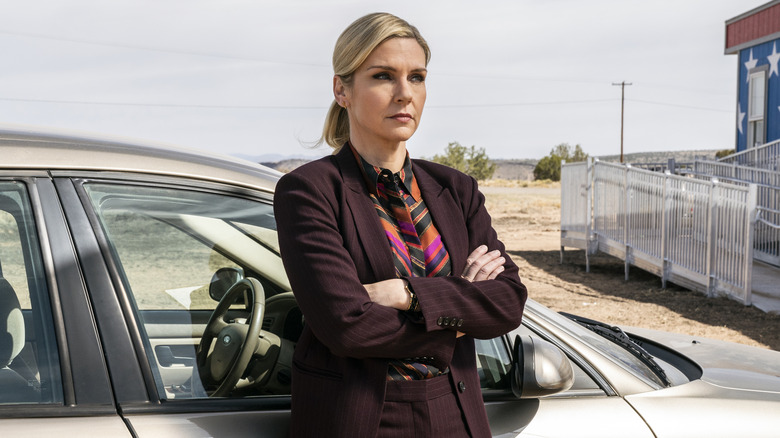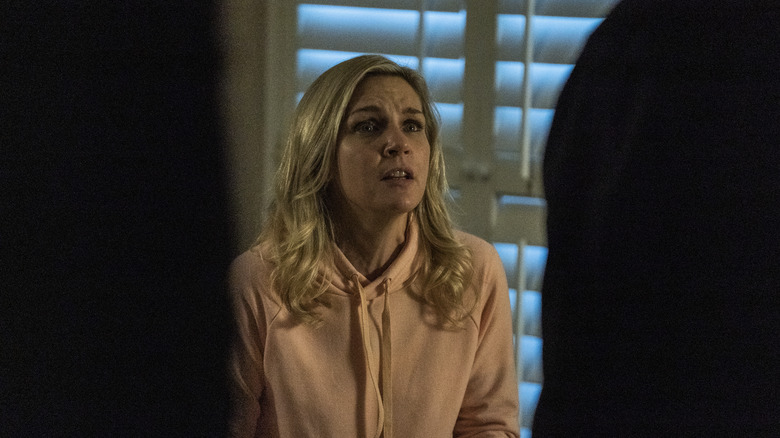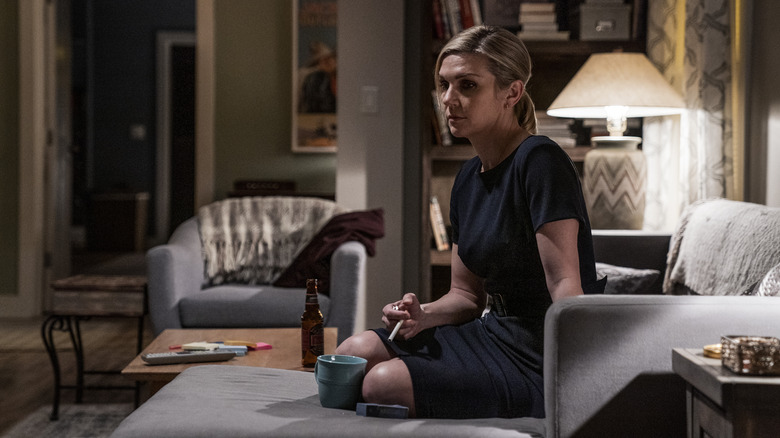Better Call Saul's Greatest Performance Finally Got An Emmy Nomination
For a show that delights in the carefully constructed minutia of process and subtlety and patience, perhaps no actor in the sprawling and immensely talented ensemble cast better represents the ethos of "Better Call Saul" than Rhea Seehorn as Kim Wexler. Her character functions as the heart, soul, and moral center of the series, serving as Jimmy McGill's (Bob Odenkirk) conscience while navigating her own intensely compelling personal journey through the legal (and, despite her best efforts, criminal) landscape of New Mexico.
But Seehorn's performance — consistently praised by viewers and critics since the very first season, yet only belatedly getting the awards attention it so obviously and richly deserved from the start — has always stood out as a giant among giants, no matter what kind of material the writers' room threw her way. And as effortless as the actor made it look, that was no easy task when sharing screen time with the likes of powerhouses such as Jonathan Banks, Michael Mando, Tony Dalton, Michael McKean, and, of course, the always-phenomenal Bob Odenkirk. Yet now, finally, Rhea Seehorn's tireless efforts have been rewarded with an Emmy nomination for Outstanding Supporting Actress in a Drama Series ... her first and only nomination for "Better Call Saul" as the series draws to a close, absurdly enough.
Say it with me, folks: it's about damn time.
An Emmy-unfriendly performance?
All one needs to do is take one look at the types of performances that lend themselves to receiving love from the Emmy voters and it quickly becomes apparent why Rhea Seehorn's Kim Wexler has repeatedly found herself on the outside looking in during awards season. Like most awards bodies, the Emmys tend to naturally gravitate towards recognizing the showiest, loudest, and most in-your-face performances in any given year. That's great news for actors who benefit from monologue-heavy and viral-ready scenes (looking at you, "Euphoria" and "Succession"), but comparatively less so for those such as Seehorn who put in quiet, layered, and yeoman work on an episode-by-episode basis.
But, importantly, that's not to suggest that Seehorn's repeated snubs at the Emmys were in any way justified. Precisely the opposite, in fact.
As subtle and deftly nuanced as she's proven to be, few would claim that co-creators Vince Gilligan and Peter Gould and their team of writers have neglected to provide Seehorn with those show-stopping moments where she's tasked with laying it all out there. Just last season (though over two years ago in real time), Lalo Salamanca's (Dalton) unbearably tense confrontation in Jimmy and Kim's apartment resulted in our favorite character bravely stepping up and telling off the show's most fearsome villain the only way that the irrepressible, tenacious, and feisty Kim knows how. In fact, the last six seasons are littered with patented Kim Wexler moments that neatly summarize why she's become such a fan-favorite and why her uncertain fate has become a constant source of anxiety among viewers.
Throughout it all, however, the needs of the story have always come first — and Seehorn has always risen to the occasion.
Subtlety is queen
Now that all of our ceaseless complaining about Rhea Seehorn's snub can thankfully come to an end (although be aware that our coordinated campaign to support her actual win now begins!), there's perhaps no better time to sit back and truly appreciate just what the perfectly-cast actor brings to the table — and how "Better Call Saul" simply wouldn't work without her.
The key to recognizing just how much the performer brings to her role — and don't forget, she added directorial work to her responsibilities with the season 6 episode, "Hit and Run" — starts and ends with her irreplaceable value as the angel (and, since the season 5 finale, the demon as well) on Jimmy McGill's shoulders. Ostensibly, the main thrust of the series follows Jimmy's tragic regression into the Saul Goodman caricature who barely seems to contain any depth whatsoever underneath his huckster exterior and grossly immoral practices. But both viewers and the writers themselves quickly realized that Kim's parallel arc as Jimmy's friend, confidant, and eventually his wife proved just as fascinating to watch. In no time at all, the inevitability of Jimmy's downfall derived its tension out of whether the occasionally scheme-loving Kim would be able to pull herself back from the brink or give into her indulgences.
All of these conflicting emotions (and, mind you, largely interior conflicts) have been consistently brought to life through easy-to-miss body language: micro expressions on Seehorn's face, the set of her shoulders while talking to Jimmy, and her impeccably modulated delivery of even the most minor lines of dialogue. What's already present on-page built the foundation for Kim's strength as a foil to Jimmy, but Rhea Seehorn elevated that to another level entirely.
And now, long overdue, she finally has that Emmy nomination. It's about time the awards shows caught on to what everyone else has known for years.


